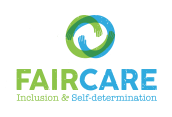
In the FairCare project, organizations from 6 countries (Germany, Italy, Cyprus, Hungary, Ireland, Spain) work together to create and promote independent, self-determined life in long-term care.
The strength of the project is that it involves ALL relevant target groups, who participate in close cooperation in the development of a training course for this purpose.
The aim of this training program is to enable people with disabilities and/or in need of care to exercise self-determination in long-term care. The training will support them in communicating their own needs and wishes more effectively, thereby allowing them to exercise greater autonomy in their daily lives.
Project duration: 01.10.2024.- 31.05.2027.
The target groups of the project are participants in all aspects of long-term care, whose cooperation is necessary to strengthen social inclusion and independent living:
The primary target group is the elderly and people with disabilities in need of care, who want to live an independent life in their chosen living environment, with appropriate support services.
The elderly and disabled population is a very heterogeneous group. Many people become disabled to some degree as a result of their age. It is important to keep in mind that many older people do not consider themselves disabled, but in fact they have similar experiences. For example, because of their age, older people are not considered to be able to live independently and self-determined lives.
The secondary target group are relatives, friends and other informal carers who provide them with the necessary care and support services, which the professional care system does not provide or cannot provide sufficiently in the desired form and quality.
As affected people, they also have individual needs and challenges that need to be supported. However, informal carers are most often neither sufficiently equipped with the training to carry out their tasks nor viewed as knowledgeable and experienced resources in the organization and provision of care.
The tertiary target group are formal carers. Who want to work in a support and care system in which they contribute their professional skills in such a way, that people in need of care live as self-determinedly, safely and independently as possible and can participate in social life.
